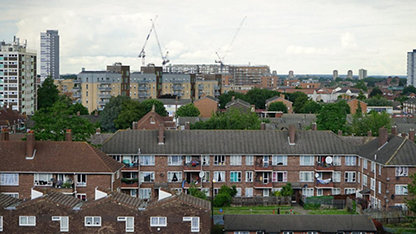The UK Government 2023 budget had long been tipped to be relatively low-key in comparison to previous years, especially for the built environment.
Set against the backdrop of an increasingly likely general election in early 2024, an economy still recovering from the political and fiscal turmoil of last autumn, and pressure from strike action, the war in Ukraine and a cost-of-living crisis, the Chancellor faced one of the toughest budgets for years.
The Office for Budget Responsibility expects inflation to fall from 10.7% in Q4 2022 to 2.9% by the end of 2023 – a welcomed announcement for businesses and consumers.
RICS have analysed the key announcements and implications for the built environment below.
Infrastructure
Going into the budget, it was a fair assumption to say it would be a mixed bag for infrastructure. Earlier rumours of significant delays and scaling back of High Speed 2 were not formalised in the budget, although we have already seen budgets for active travel infrastructure cut significantly.
The government did commit £20 billion in carbon capture technologies as well as additional investment in nuclear energy production.
Reducing inflation was a priority in this budget, and as such will have implications for infrastructure and construction projects – many of which in recent months and years have seen delays and overspending become the norm. This does prove a timely reminder of the benefits RICS standards including the International Cost Management Standard and Dispute Resolution Service offer in project management, helping to reduce delays and overspend.
Energy cost support
The government reaffirmed its support for consumers and businesses with the high cost of energy bills.
The government reversed its proposed increase in the energy price cap to £3,000, remaining at the current £2,500 threshold. This is a welcomed intervention, especially with Energy Bill Support Scheme to assist consumers through winter winding down and the slow but steady decrease in wholesale energy prices.
Furthermore, businesses can also benefit from the Energy Bills Discount Scheme which will support non-domestic properties with energy costs. The Chancellor also confirmed an extension of the Climate Change Agreement to March 2025 for UK industry to receive fiscal incentives to decarbonise and reduce their energy consumption.
RICS welcomes the continued cash support but also emphasises our previous comments on the need to reduce the cause of high energy usage to begin with – especially through retrofitting and decarbonisation. As announced in his previous Autumn Statement, the Chancellor has created the Energy Efficiency Taskforce and schemes including ECO+ will go some way towards meeting this need but not at the scale or pace required for meaningful change.
Housing
Housing remains one of the most critical elements of UK economic stability and growth and RICS is disappointed by the lack of housing ambition in this budget.
The fallout from the ‘mini-budget’ in September 2022 hit the housing market hard – with prospective buyers unable to secure mortgages due to rising interest rates. While the market stabilised somewhat, we still have the challenge of limited housing stock and rising rents. A reduction in inflation will help those accessing mortgages, but we remain in an environment where demand outstrips supply.
Earlier this year, we called for additional investment and support from government towards creating more housing stock to support buyers and renters – through new builds and suitable, standards-driven conversions. This is especially important after the government removed its housebuilding target.
Levelling up and devolution
The Chancellor has restarted former Prime Minister’s Liz Truss plans for the creation of investment zones to drive growth in certain parts of the UK. Businesses will be offered fiscal benefits including lower National Insurance contributions, business rates discount and reduced stamp duty to invest in these communities, with a package of support totalling £80 billion.
The government has also announced additional funding and powers to be devolved to regional mayors, specifically West Midlands and Greater Manchester, where regional control will now sit in areas including education, transport, and housing. This devolution of powers will create opportunities for more localised placemaking to be created, aligning with our Levelling Up and Sustainable Placemaking Report.
Phil Clark MRICS, Chair of the RICS Commercial Property Forum commented:
“We are delighted to see the Government has taken an monumental step forwards in handing regional mayors more control in how they spend their budgets. This opportunity will enable a more strategic and long-term approach to securing private funding for vital projects that are required to help level-up".
RICS Senior Economist Tarrant Parsons commented:
“The immediate outlook for the UK economy is now deemed a little more favourable for the Chancellor relative to the backdrop at the time of the Autumn Statement. The latest forecasts from the OBR revised away the technical recession previously foreseen in 2023, while unemployment is now anticipated to peak at a lower rate than before (4.4% vs 4.9%). Moreover, measures announced today, such as the extension of the £2500 energy cap for three months and changes to fuel and alcohol duty, are expected to reduce headline inflation by 0.7% in 2023/24, providing a flicker of relief for households struggling with the cost-of-living crisis.
That said, the economy is still seen stagnating over the next twelve months (-0.2% annual growth), while inflation is anticipated to average 6.1% during 2023. As such, disposable incomes will remain under considerable pressure this year despite the government being considered ‘on track’ in relation to its goals of halving inflation and growing the economy. On the second of those points, UK GDP is projected to return to growth of 1.8% next year before expanding 2.5% in 2025 and by 2.1% in 2026. Overall, economic growth forecasts for 2023-4 and 2024-5 were upgraded by 1.4% and 0.1% respectively compared to the OBR’s previous estimates, while projections for the following three years were cut by an average of 0.3% per annum.
The improved outlook for the public finances is a result of stronger than expected tax receipts of late (which are now anticipated to persist), lower energy prices, and brighter near-term economic growth projections. Given this better assessment, today’s Spring Budget also had room for a few giveaways, with the extension of 30 hours free childcare to children over 9 months old perhaps the most eye-catching measure announced. Alongside this, there was a broader focus on reversing the sharp rise in economic inactivity seen across the UK since the start of the pandemic (now standing at 21.3% compared to a pre-pandemic low of 20.2%). New measures were introduced to reduce inactivity among parents, the long-term sick and disabled, older workers, and welfare recipients. For instance, pension tax rules are to be reformed in an attempt to incentivise older workers to remain in the labour market. Consequently, the OBR judges that these policies will be enough to cause the participation rate to rise from 2025 onwards, going some way to address the shortfall in labour supply which has added to domestic inflationary pressures."














